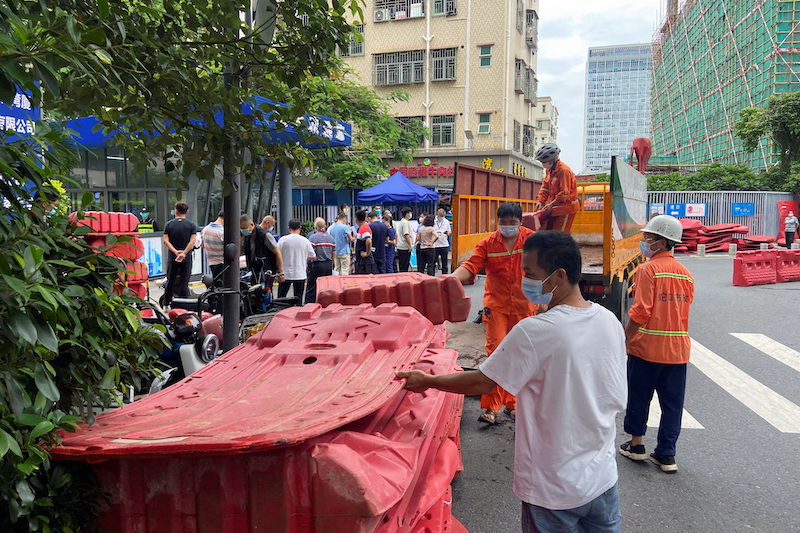Guangzhou on Wednesday became the latest big city in China to impose Covid-19 curbs, joining Shenzhen in the fight against local outbreaks.
Officials in the city of 19 million residents close to Hong Kong have chosen to smother a potential outbreak after just five locally transmitted infections were reported on Tuesday.
The move will deepen uncertainty over business and daily life one of the most economically vibrant metropolises in the country’s southeast.
Covid restrictions have been imposed in at least 41 cities, including several of China’s biggest business hubs this week, affecting the activities of tens of millions of people.
Mindful of balancing economic needs with efforts to contain each and every outbreak, Guangzhou authorities said the curbs would last for just a few days, although some smaller cities extended restrictions earlier this month.
ALSO SEE: Concern on Impact of Covid Curbs in China’s Big Business Hubs
Schools Defer New Semester Start, Services Cut
China’s so-called “dynamic zero-Covid” policy makes it an outlier as other countries gradually emerge from coronavirus restrictions, despite the cost to the world’s second-largest economy that already faced slower growth.
Guangzhou, a city of nearly 19 million residents near Hong Kong, but authorities ordered certain areas in one district to close indoor entertainment venues and dining at restaurants until Saturday.
The city also ordered all kindergartens and primary, middle and high schools in the district to delay resuming fall semesters and halt offline sessions that have already started, according to state media reports on Wednesday.
Bus and subway services in the district were also reduced.
In Shenzhen, at least four districts with around 9 million residents in total, have already ordered closure of entertainment and cultural businesses and halted or reduced restaurant dining for a few days.
The combined economic output of Shenzhen and Guangzhou reached 5.89 trillion yuan ($855 billion) last year, equal to about half of South Korea’s gross domestic product (GDP).
41 Cities Affected
According to Capital Economics, 41 cities, responsible for 32% of China’s GDP, are currently in the midst of outbreaks – the highest number since April.
“For now, the resulting disruption appears modest, but the threat of damaging lockdowns is growing,” said Julian Evans-Pritchard, senior China economist at Capital Economics.
“And even if they are avoided, we expect growth to remain subdued going forward.”
China reported 1,675 new domestically transmitted Covid infections for Monday August 30, the National Health Commission said on Wednesday, compared with 1,717 new local cases a day earlier.
Most cases were found in the region of Tibet and Sichuan province in the southwest.
The commercial hub of Shanghai would tighten control over large gatherings and avoid unnecessary ones, a municipality official said, as the city reported two new local infections on Tuesday, including one found in the community.
Large conferences and events involving travel across cities and regions must be downsized, delayed or moved online whenever possible, Wu Qianyu, a Shanghai health official, told a news briefing.
- Reuters with additional editing by Jim Pollard
ALSO SEE:
China Think Tank Urges Scrapping of ‘Zero Covid’ Policy – AP
China Shuts World’s Biggest Electronics Market Due to Covid
IMF Urges China Rethink on Zero-Covid, Property Crisis
























